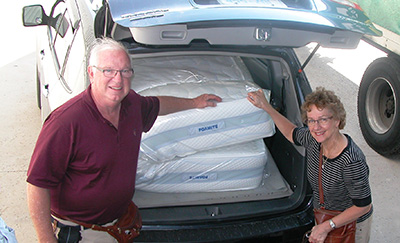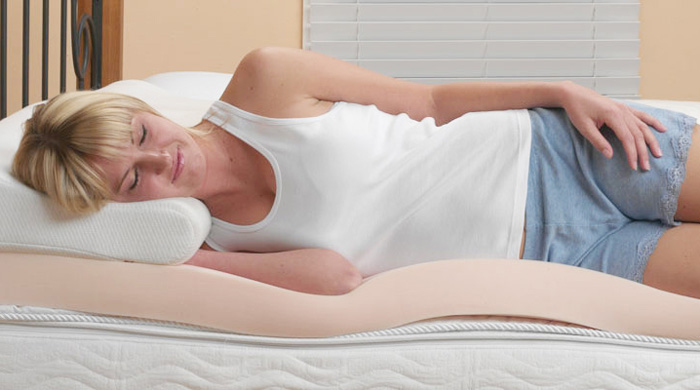Keep a regular sleep schedule
Getting in sync with your body's natural sleep/wake cycle is the key to good sleep. You will feel more refreshed and energized.
Set a regular bedtime
Having regular sleep and wake times each day, even on weekends, will help condition your body's natural sleep/wake cycle. If you tend to stay up later on weekends, make sure you still try to wake up at your regular time or at most an hour later. You can always make up for lost sleep with a short nap.
Wake up at the same time every day
If you're getting enough sleep, you should wake up naturally without an alarm. If you do, then it could be a sign that you are not getting enough sleep, perhaps you need to start sleeping earlier.
Nap to make up for lost sleep
Most of us have a natural dip in alertness between 2 - 4 pm (depending on when you wake up and start working). A quick power nap can be extremely effective to recharge. You should limit your nap to less than 30 minutes to prevent from entering into a state of deep sleep. If you do you will feel even worse when you wake up.
Fight after-dinner drowsiness
If you're sleepy after dinner, try some stretching or light chores to keep awake. Falling asleep too early will disrupt your normal sleep cycle. If you have a late after-dinner nap you may wake up in the middle of the night and have trouble falling back to sleep.
Limit shift changes if possible
Shift workers have sleep disturbances due to biological cues from light that affects the body's natural instinct to sleep. If you do work night shift, to help regulate the body, try to be in as much bright light as possible but in your bedroom, make sure you have black-out curtains to shut out the day light. Limit any caffeine to the early part of your shift. When switching shift cycles, you may need up to a week to adjust to changes in your sleep routine.
Exercise regularly and keep fit
Regular exercise is a great way to improve your sleep. A morning workout is an excellent way to wake up the body
Going for a run or doing some aerobics releases stimulants which perk up the body. If you are injured or disabled, you can still benefit from exercise. Make sure you are doing the right exercises for your disability until you are well enough to continue a regular exercise program.
Avoid exercising too close to bed time
Exercise produces stimulants that will make it difficult for you to sleep. The body also needs more time to cool down because a cooler body temperature promotes sleep. If you need to exercise, do it before dinner. A low point in energy occurs a few hours after exercise; sleep will then come more easily.
Maintain a regular exercise regime
All you need is thirty minutes a day and you can even break it up into different sessions and still get the benefits. Try a brisk walk, ride a bicycle, do some gardening or perhaps you prefer yoga.
Create a relaxing bedtime routine
A relaxed mind is the key to better and deeper sleep. A good pre-bedtime routine will condition the brain that it's time to wind down and get ready for bed.
Turn off your computer and TV
TV actually stimulates the mind partly due to the type of late-night content which will frequently have disturbing, violent material. Furthermore, the light emissions from the TV or computer screen will affect the quality of your sleep.
Reserve your bed for sleeping
If you associate your bed with events like work or where you pay your bills, it will be harder for you to wind down at night. Use your bed only for sleep and sex. That way, when you go to bed, your body gets a powerful cue that it's time to relax and to nod off.
Relaxing bedtime rituals:
- Read a light, entertaining book or magazine.
- Take a warm bath an hour before.
- Make simple preparations for the next day to avoid worrying.
- Aromatherapy or light massage.
- Do some light stretching and breathing exercises.
- Listen to soft relaxing music.
Things to avoid
It's generally good to have a hot drink of chamomile or lavender tea at night but avoid all stimulants with caffeine, alcohol or nicotine. You should also avoid eating and exercise close to bed time.
Create the right bedroom environment
The quality of your bedroom environment makes a huge difference in how well you sleep.
Keep noise down
A general rule for good sleep is to keep your bedroom as quiet as possible. If you live in a noisy area and can't control noise from barking dogs, loud neighbors, city traffic, invest in soundproofing your room with heavy curtains.
Block out the light
Make your bedroom as dark as possible. Heavy curtains or shades can help block light from windows. So can an eye mask to cover your eyes. Electronic devices also produce sufficient amounts of light that may interfere with the sleep process. A new study has shown that the bright light of a computer screen may alter the body's biological clock and suppress the natural production of melatonin that's critical to the normal sleep/wake cycle.
Maintain a consistent room temperature
Most people sleep best in a slightly cooler room (around 65 degree F or 18 degree C) with adequate ventilation. If is too cold, your body will be working extra hard to produce heat to keep your core temperature up. If the weather's too hot, try opening a window or turn on a fan or an air conditioner if you have one.
Make sure your bed is comfortable
Your bed should be big enough for you and your partner. It is also important to invest in a mattress with the right grade of foam that will give each one of you the best comfort and support for a very long time (10 to 15 years). A full foam mattress, without springs, will also prevent any squeaking or noise that is common with conventional mattresses as they age. Another benefit of memory foam or contour foam pockets is that they help to prevent motion transfer from one end of the bed to the other.
If you wake up often with a sore back or an aching neck, you may need to invest in a new mattress or try a different pillow that gives you the proper support and that works with your mattress as a system. You can experiment with different levels of mattress firmness, but it is also a very good idea to use our Ergocheck pressure system to help you determine what firmness is right for you. This is important because according to sleep experts - 68% of people sleep on a mattress that is the wrong firmness.
Watch what you eat
It's particularly important to watch what you eat especially in the hours leading up to your bedtime.
Stay away from big meals at night
Try to make dinner time earlier in the evening and avoid heavy, rich foods within two hours of bed time. Fatty foods take a lot of work for your stomach to digest and may keep you up. You should also be cautious of spicy and acidic foods in the evening, as they can cause stomach trouble and heartburn.
Don't go to bed hungry
A light snack before bed can help promote sleep. When you pair foods that contain tryptophan with carbohydrates, it will help to calm your brain and allow you to sleep better. For even better sleep, try adding extra calcium to your dinner or night time snack. However, one should avoid foods containing tyramine (these include: bacon, cheese, ham, aborigines, pepperoni, raspberries, avocado, nuts, soy sauce, red wine) which causes the release of norepinephrine, which is a brain stimulant.
Avoid alcohol before bed
Alcohol increases the blood alcohol concentration (BAC) resulting in a stimulating effect. After BAC peaks and begins to decline, the alcohol has a sedative effect, so depending on the timing and amount of alcohol intake, it could either facilitate or inhibit sleep. Alcohol metabolizes quickly during sleep and could cause sleep disturbance if withdrawal symptoms kick in. Alcohol is also a diuretic which may cause you to visit the toilet in the middle of the night. Alcohol is also linked to snoring which impacts breathing and reduces oxygen in your blood.
Cut down on caffeine
You might be surprised to know that caffeine can cause sleep problems up to ten to twelve hours after drinking it! Consider eliminating caffeine after lunch or cutting back your overall intake.
Avoid drinking too much liquid in the evening
Drinking lots of water, juice, tea, or other fluids may result in frequent bathroom trips throughout the night. Caffeinated drinks, which act as diuretics, only make things worse.
Quit Smoking
Cigarettes contain nicotine that will affect your ability to sleep well. Nicotine is a stimulant that keeps you awake and that disrupts your sleep. In addition, smokers actually experience nicotine withdrawal as the night progresses, making it harder to sleep soundly. Some Smokers, who chose to ignore the facts, claim that a puff of a cigarette makes them feel calmer and helps them relax. That may be the case but as soon as the nicotine enters your blood stream it will interfere with the body's ability to fall asleep and to stay asleep.
Nicotine and the induced release of adrenaline also affect the natural sleep cycles; therefore, people that smoke cannot achieve a proper deep sleep. The restorative benefits of sleep get reduced and this in turn leads to sleep debt. Sleep debt or sleep deficit is the cumulative effect of not getting enough sleep. A large sleep debt may lead to mental and/or physical fatigue. In sleep debt you feel so exhausted that you generally forget what it feels like to actually not be exhausted.
Keep anxiety and stress in check
People prone to stress and worry can find it very difficult to fall asleep. Do not look at the clock as it will just make it more difficult to sleep.
Relaxation techniques for better sleep
Relaxation is beneficial for everyone, but especially for those struggling with sleep. Practicing relaxation techniques before bed is a great way to wind down, calm the mind, and prepare for sleep. Try deep breathing or visualizing a relaxing place.
Stressed up about something
If stress of managing work, family, or school is keeping you awake, you may need help with stress management. When something is bothering you, make a brief note about it on paper and postpone worrying about it until the next day when you are fresh and it will be easier to deal with. Similarly, if a great idea comes to mind and it is keeping you awake, make a note of it on paper and fall back to sleep knowing that you will be much more productive and creative, the next day, if you get a good night's sleep.
Managing sleep disorder
If you have trouble falling asleep night after night or if you always feel tired the next day, you may have a sleep disorder. It may be necessary to seek more advice from your doctor or a facility that deals with sleep disorders. Most sleep disorders can be treated effectively. When worrying becomes a mental habit that we repeat night after night, chronic insomnia is inevitable. You need to learn more about insomnia and its remedies or consult a sleep doctor. Sleeping pills can only produce temporary improvement and have long term side effects. Underlying mental health problems, such as anxiety or depression should be addressed first.
Ways to get back to sleep
It is quite normal to wake on occasion during the night. But if you're having trouble falling back to sleep, the following tips may help.
Don't think it's a big deal
The key to falling back to sleep is not to worry about not being able to fall asleep. You must remain relaxed and try to calm yourself. Try not to stress over the fact that you are awake and that you may not be able to fall asleep again. That very stress and anxiety will encourage your body to stay awake. Learn to relax.
Try relaxation techniques such as deep breathing, meditation or visualization. Although it may not be a replacement for sleep, rest and relaxation - it still helps to rejuvenate your body. If you've been awake for more than 15 minutes, try getting out of bed and doing a quiet, non-stimulating activity, such as reading a few pages of a book. Postpone worrying and brainstorming
Again, when something is bothering you, make a brief note about it on paper (keep a pad and pen, by your nightstand) and postpone worrying about it until the next day when you are fresh and it will be easier to deal with. Similarly, if a great idea comes to mind and it is keeping you awake, make a note of it on paper and fall back to sleep knowing that you will be much more productive and creative, the next day, if you get a good night's sleep. Remember - Every day should start with a good night's sleep!























